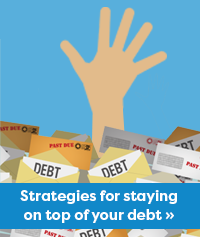Setting Financial Boundaries With Others

Helping others is a wonderful thing. But what happens when trying to help others takes a toll on your financial wellbeing? If you’ve ever flown on an airplane before, you’re probably familiar with the saying that you should put on your own oxygen mask before helping somebody else with theirs. Personal finance is very similar; while loaning money to loved ones can feel like a good deed, over time this can negatively impact your own financial health, as well as theirs, if you’re not careful. In this CUAdvice article, we’re going to explore the importance of setting personal financial boundaries so that you can keep your financial health in check, guilt-free.
Lending risks
When it comes to finances, drawing a line in the sand can be difficult. While it’s easy to tell yourself that you won’t lend money, it can be a lot harder to tell a loved one. After all, what’s wrong with supporting friends and family when they need our help?
First, let’s unpack the realities of money lending.
One study found that adults aged 40-60 years old are part of an ‘intergenerational sandwich’ that feels responsible for financially supporting both their adult children (primarily with non-essentials like travel and transportation) as well as their ageing parents (primarily with essentials like housing and groceries), causing their own savings and financial goals to suffer. This can be a complicated and stressful situation to find yourself in; on one hand, you want to make sure family is taken care of. On the other, when your finances suffer, you could end up continuing this cycle for your own children as you age. While helping family with essentials might be non-negotiable for you, it could be time to set boundaries for non-essential lending.
When someone you care about comes to you and says they need financial help, it’s entirely normal to want to help them. But what happens when they ask repeatedly, and the loans aren’t repaid, or are repaid much later than agreed upon? At this point, your good deed may instead be enabling your loved one to continue making poor financial decisions. An emergency is one thing—but repeatedly asking you for loans can not only strain your relationship with this person, but your own financial wellbeing.
Setting boundaries
Before you start setting boundaries with others, it’s good to have a solid foundation for yourself. That might mean establishing your own financial goals and developing a budget to get there. This is an important first step because once you know what you need to achieve your goals, you’ll be in a better position to understand your capacity to help others. For example, if you’re saving up for a down payment on a house, and you’re on a strict monthly budget to reach this goal, it’s probably not the right time to lend money to anyone else.
Once we have our own financial goals established, what’s next? When it comes to setting boundaries, oftentimes the hardest word we can say is ‘no.’ Frequently, individuals will lend money, even against their better judgement, due to feelings of guilt associated with letting somebody down. The money talk can be a deeply personal and even emotional conversation to have, especially with our loved ones. In fact, a recent survey found that 44% of people consider finances to be the most difficult topic to talk about. When we don’t want to damage a relationship with somebody we care about, setting firm boundaries might feel harsh. But boundaries aren’t about punishing anyone else—we set them to make sure others understand the types of behaviour that we will and will not accept.
So, if lending money to somebody is starting to put a strain on your relationship with them, how can you set healthy financial boundaries, for everyone’s wellbeing?
One type of boundary you can set involves the terms of the loan. Instead of simply writing a cheque and agreeing to get it back someday, have a conversation about your expectations for when it will be repaid. You can put this in writing, so you have something to reference if you’re not repaid by the agreed upon date. This is also useful to keep documented in case you’re asked for a loan again in the future. You can decide whether you trust that this individual will stay true to their word based on past behaviour.
Another term of your loan might be that you’ll need to see evidence that the money is being used for the intended purpose. For example, if your adult child asks for a loan so they can go back to school next semester, you can ask for enrollment verification before lending them tuition or textbook money. This is also a good indicator of their likelihood to follow-through, as you can see how reliable they are with providing these details when requested.
If you’ve reached a point with a loved one where you don’t think you can continue to support them financially through loans, but you don’t want to blindside them, you can set a boundary by offering a timeline for when you’re no longer going to lend money. By giving notice, they’ll have the opportunity to get their finances in order over a set period of time. Communicate to them that you have a financial goal of your own that you’re working towards, and that in one, three, or maybe six months, you will no longer be lending money, so they’ll need to determine a new plan of action. You can offer to help them in other ways—perhaps by assisting them with job applications if employment is an issue or creating a budget that works for their lifestyle. You or this person can also schedule a meeting with a Financial Advisor, a professional who can help them determine the best next steps to become financially independent. There are plenty of ways to help somebody who’s having money troubles, without creating troubles of your own.
Financial boundaries don’t have to be limited to lending money, either. They can also be useful in instances where an activity with a loved one is out of your budget. For example, if you have a friend who regularly invites you out to high-end restaurants or on expensive vacations, being firm about your financial limits can help to avoid misspending and even resentment down the line. Setting boundaries on your own spending with others could even be as simple as establishing a gift-giving budget for the next special occasion. Remember to be clear about your own financial goals, and don’t be afraid to suggest alternatives that are within everyone’s financial reach.
The gift of giving
Our last piece of advice when it comes to developing financial boundaries is the philosophy that instead of lending money you should give money—that is, without the expectation that you’ll ever see it again. While this may seem counterintuitive to improving your financial health (after all, wouldn’t you want to be repaid?) it’s actually a good way to measure your capacity to help. The logic here is that if you don’t have the funds to simply give away your money (i.e., to take on the risk of never seeing it again), you shouldn’t be lending it in the first place. If you do, however, have room in your budget to give somebody money, you can do so without the risk of resentment if they don’t pay you back. And if they do pay you back—that’s great! This approach is a helpful way to ensure that there are no hard feelings down the line.
The better way to deal with loans
If you or a loved one are frequently struggling to manage the cost of living, there are options other than turning to a friend or a family member for a loan. CUA has a variety of budgeting tools, loan products and savings products that can help you reach your full financial potential. Our personal loans offer flexible terms and repayment options that work for your budget. Alternatively, a CUA Line of Credit (LOC) can help you feel prepared for those unexpected emergencies and beyond, with access to your funds at any time. And of course, our team of financial experts are always ready to discuss ways to help you achieve your financial goals. Call us at 902.492.6500 or email us any time with your questions.
Published May 11, 2023






